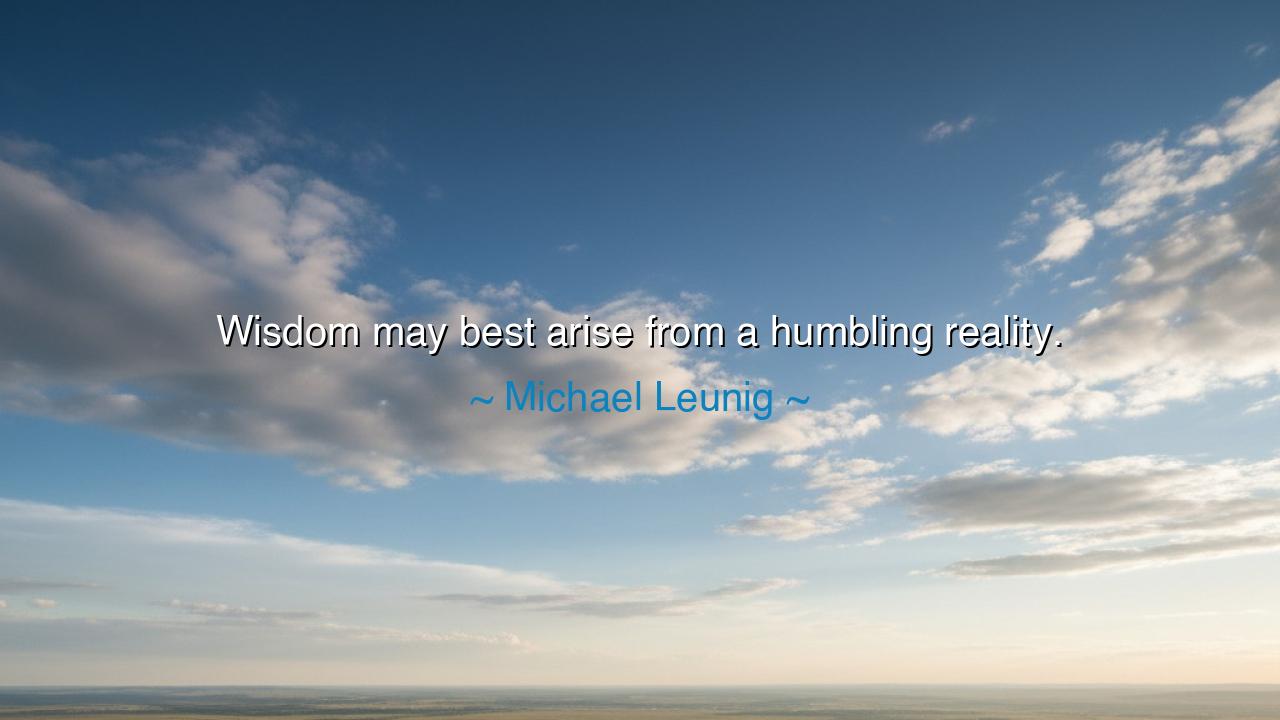
Wisdom may best arise from a humbling reality.






Listen, O children of the future, for I bring to you the wisdom of Michael Leunig, who spoke these words: "Wisdom may best arise from a humbling reality." These words remind us that true wisdom is often born from the most challenging and humbling experiences of life. It is not in the moments of triumph, nor in the grandeur of success, that we learn the deepest truths, but in the quiet, humbling moments of struggle, failure, and hardship. Wisdom comes when we are forced to confront our limitations and the reality of the world as it truly is, not as we wish it to be.
Consider the great philosophers of old, who were often shaped by their humbling realities. Socrates, despite his wisdom, lived in a time of great political and social turmoil in Athens. His humility in the face of ignorance and his willingness to question even his own understanding of the world were key to his pursuit of truth. He was put to death for his beliefs, yet his humbling fate became the fertile ground from which the greatest philosophies of the Western world would grow. Socrates’ wisdom arose not from his success but from his willingness to confront the humility of his own ignorance and embrace the uncomfortable truths that came with it.
In the same way, the life of Nelson Mandela offers a powerful example of wisdom born from humbling reality. Imprisoned for 27 years, Mandela faced an unimaginable hardship. Yet, it was through his time in prison, in the most humbling of circumstances, that he gained the wisdom to lead his nation through reconciliation rather than retribution. The humbling reality of his own suffering and the suffering of his people gave him the clarity of vision needed to seek peace, even in the face of deep injustice. His wisdom was not born of pride or victory, but of the humility he cultivated through years of endurance.
Similarly, consider Abraham Lincoln, who, in the darkest days of the Civil War, faced the weight of national division and personal sorrow. It was through the humbling reality of the war and the loss of his son that Lincoln’s leadership was tempered. His struggles with failure and the burden of war forged in him a wisdom that would ultimately preserve the Union and free the slaves. Lincoln’s ability to lead with compassion, despite the overwhelming pressure of the moment, came from a humbling acceptance of the deep imperfections in both his nation and himself.
So, O children, understand this: wisdom is not a gift granted in moments of ease and glory, but a treasure forged in the fires of hardship and humility. When the world strips away the falsehoods and illusions we cling to, and we are faced with the raw truth of our limitations, we open ourselves to the greatest wisdom. It is in those humbling moments, when we acknowledge our own vulnerability, that we become capable of seeing the world with clear eyes and acting with true insight. Seek not only the high and the proud, but the humbling realities of life, for it is there that the deepest and most lasting wisdom is born.






TNtran thi niem
From a spiritual point of view, I think this quote speaks to surrender and acceptance. Sometimes the most humbling experiences—illness, failure, or heartbreak—strip away illusions and force us to see life more clearly. But I wonder, does everyone emerge wiser from such experiences, or only those who reflect deeply afterward? Maybe humility alone isn’t enough; it has to be met with self-awareness and a willingness to learn.
HLNGUYEN TRAN HA LINH
This statement makes me reflect on the difference between knowledge and wisdom. Knowledge can come from study and effort, but wisdom seems to require a deeper confrontation with reality—often one that challenges our sense of control. Could it be that humility is the bridge between what we know and what we truly understand? It’s an uncomfortable but powerful reminder that wisdom might only come when we’re willing to be wrong.
HAtran nguyen hoai an
Reading this, I can’t help but connect it to our modern obsession with success and confidence. We’re encouraged to appear strong and self-assured, yet this idea suggests that true wisdom arises only when ego gives way to humility. How does one stay open to being humbled in a world that punishes vulnerability? It feels like the very experiences that teach us most are the ones we try hardest to avoid.
BMBeo Meo
I find this thought both beautiful and sobering. It implies that wisdom isn’t born out of arrogance or certainty but from realizing our limitations. Maybe that’s why some of the most insightful people are those who’ve faced loss, failure, or vulnerability. But should we have to suffer to grow? It feels unfair that the path to wisdom often demands a kind of breaking before rebuilding begins.
BT8/1-36-Lam Ly Bich Tram
This quote really touches me because it suggests that growth often comes from struggle or humility. It makes me think about how people rarely gain deep understanding during moments of pride or success. Do we actually need hardship to become wise, or is that just a comforting idea to make sense of pain? I wonder if wisdom could develop equally through joy and gratitude instead of only through humbling experiences.